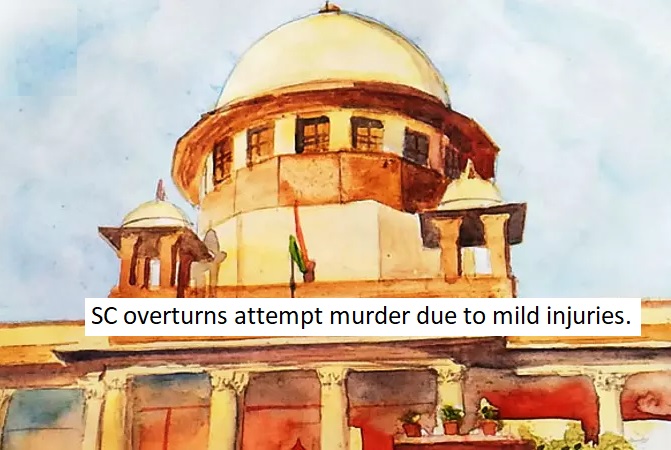


On November 28, the Supreme Court rendered a significant judgment, overturning a conviction in a case related to attempt to murder. This decision hinged on the careful consideration of two pivotal factors that played a crucial role in reshaping the legal narrative surrounding the case.
Firstly, the Court underscored the absence of repeated or severe blows as a defining aspect that led to the reversal of the conviction. The acknowledgment of this factor indicated a nuanced understanding of the dynamics of the incident in question. By emphasizing the lack of sustained or intense physical aggression, the Court seemed to delve into the core of the attempt-to-murder charge, questioning whether the actions met the threshold required for such a serious offense.
Secondly, the Court placed considerable weight on the nature of injuries sustained by the victims. Describing them as "simple in nature," the Court signaled a departure from the severity typically associated with cases falling under Section 307 of the Indian Penal Code (IPC). This shift in focus suggested a meticulous examination of the evidence, with an emphasis on the actual harm caused. The characterization of injuries as simple implied a reevaluation of the gravity of the offense and raised questions about whether the initial categorization truly aligned with the intent and scope of Section 307 IPC.
In elaborating on these factors, the Court scrutinized the case's details, acknowledging the absence of allegations pertaining to repeated or severe blows inflicted on two key witnesses, PW1 and PW2. This meticulous examination of the evidence sought to ensure that the legal proceedings aligned with the principles of justice and fairness. The Court's emphasis on the lack of sustained physical harm underscored a commitment to discerning the true intent and gravity of the accused's actions.
The decision to set aside the attempt-to-murder conviction appeared rooted in a holistic evaluation of the incident. By dissecting the elements that constitute an offense under Section 307 IPC, the Court demonstrated a commitment to ensuring that legal consequences align with the actual events. This nuanced approach reflected an understanding that not all instances of violence, even if resulting in harm, necessarily meet the stringent criteria for an attempt to murder charge.
The judgment, therefore, can be seen as a reaffirmation of the principle that legal outcomes should be proportionate to the actions in question. In cases where the severity of harm is not commensurate with the gravity of the charges, the courts have a responsibility to recalibrate the legal response. This recalibration, as evidenced in this case, involves a careful examination of the evidence, a nuanced understanding of the applicable legal provisions, and a commitment to upholding principles of justice.
In conclusion, the Supreme Court's decision to overturn the attempt-to-murder conviction on November 28 marked a pivotal moment in legal interpretation. By focusing on the absence of repeated or severe blows and characterizing the injuries as simple, the Court signaled a departure from a one-size-fits-all approach to criminal offenses. This case serves as a reminder that justice requires a nuanced understanding of the circumstances surrounding each case and a commitment to ensuring that legal consequences align with the true nature and gravity of the actions in question.
TAGS: Supreme Court Attempt to murder Conviction Reversal Factors Repeated or severe blows